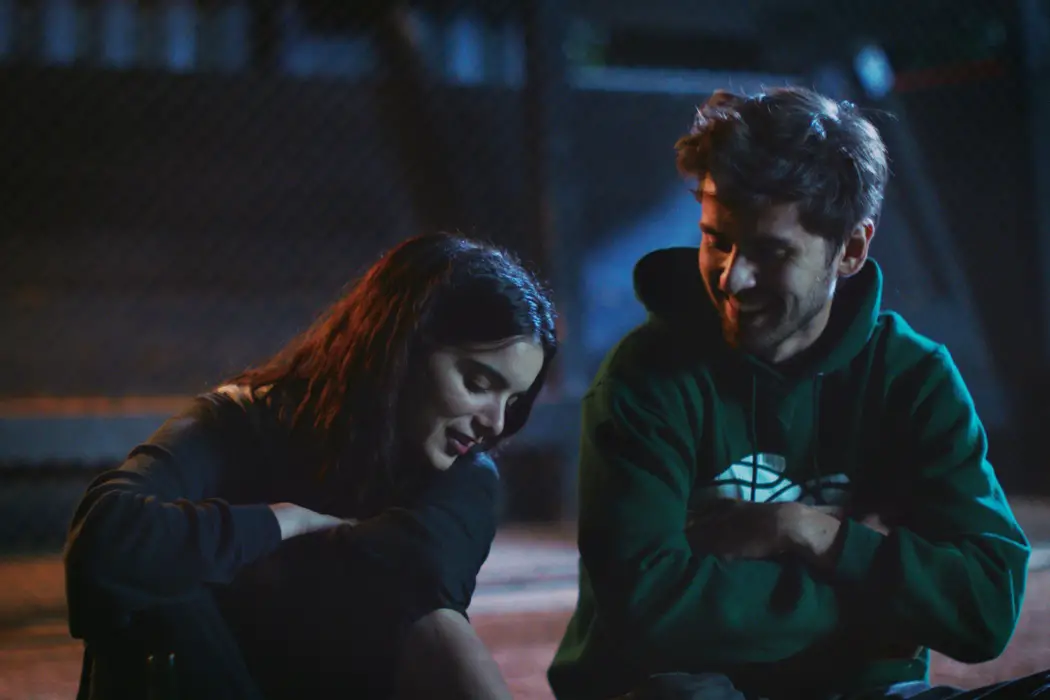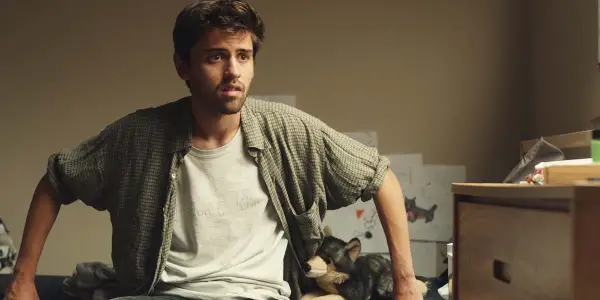SHITHOUSE: A Cathartic Experience In Ugly Beautiful

Stephanie Archer is 39 year old film fanatic living in…
“It is always darkest before the dawn.” The words of Harvey Dent are ones that go beyond the pages of graphic novels and superheroes, encapsulating reality at its worst, all while focusing on the prospects of the future. For many, we need to push ourselves out of our comfort zones, placing ourselves in unfamiliar territory, teetering the line of failure and success. For most, we will face many of these moments in life, where we can no longer rely on others to make our decision, where we can no longer stay within the arms of comfort and predictability. For many, the first time we truly experience this moment is when we leave home and embrace adulthood – college.
College is a liberating experience, terrifying in the leap one must take but exhilarating in the experiences it promises. Though for some, the push outside of the comfort zone can be an all-encompassing black hole. Shithouse, from writer and director Cooper Raiff, is the latest college drama to bring this to the forefront, giving those who may see themselves depicted here a respite from the loneliness their newfound freedom has offered. Where some flourish, others find bumps along the way.
Breaking Purgatory
Shithouse opens with Alex (Raiff), a young man starting his freshman year. Viewers are not introduced to Alex as he walks through the campus for the first time or the challenges in class. Rather, we meet him on one of the most awkward moments many of us can all relate to – sitting with his college roommate (Logan Miller). He is clearly unsure of himself or his surroundings, the stuffed husky in his arms a bit of the childhood he is clinging to. There is an immediate awkwardness as it appears he is talking to the dog, childlike behaviors matching first impressions. Yet, it is not just the stuffed animal that fills the awkwardness, it is the inability to connect and facilitate a relationship with his roommate. As he tries to address him, there is an absence of presence as the roommate does little to engage, keeping his headphones on during the conversation. Alex is not his ideal roommate, and the message is read loud and clear. The awkwardness does not stop there either.

Thankfully for Alex, he meets Maggie (Dylan Gelula), and equally awkward student in her own way and the RA for the floor, whose invitation for a one night stand turns Alex’s world around. Between the two characters, a deep and vulnerable relationship is seeded, childhood memories, ambitions, fears and a turtle farewell over wine and softball infuse a relationship neither realized they needed or could have. Yet, as serendipitous as it seems, sometimes the things we need the most get ugly and they get messy – its what you do in the aftermath that truly counts and shapes us.
Oh What a Night
Shithouse (which is literally defined as an extremely unpleasant place) gets messy, not so much in the literal college party sense, even though the film’s central party house is called “Shithouse”, but in the connectivity of humans. It is about growing up, branching out, and facing what scares us, leading our paths into turbulence and conflict. Many will avoid it, most don’t even know they need it. For Maggie and Alex, they are both in unpleasant places, each unable to move, yet knowing they can not go back. They can not go back to their families or their homes. They can not go back to undo the situations that lead them up to this point. All they can do is fuse their sorrows together, to push past what is awful to find what is beautiful.
There is a relate-ability within this film that will transcend its depiction of a college setting and find itself applicable to a menagerie of situations throughout life. College being the most relatable, it was a central point to focus to reach out to audiences of all ages. From the tiniest of details to the film’s central premise, there is a bit of something everyone will find themselves in.
Like its characters, Shithouse is not a film you will be immediately comfortable within, whether it be a recollection of yourself and others in what is being depicted or the fremdschämen you feel for Alex. Shithouse is a film that quickly grows on you, the awkwardness of Alex permeating through the celluloid into your spine. As you see Alex and Maggie begin to open themselves to one another, you will find yourself settling in as well.

Shithouse also presents a role reversal for Alex that is commendable. Alex encompasses a role typically reserved for women, taking stuffed animals to college and talking with them and sending multiple txt messages (I mean obscene amounts) – there is an extra embarrassment you have for him especially if you have ever found yourself in these same situations. He is not your typically depicted man of college looking to party and to get lucky. Rather, he is slightly feminine and vulnerable. He asks women what they like, making sure their experience is matching his. He is not afraid to cry and he is not afraid to love. But in a world that has its own view of how he should be, his strengths become his struggles.
Raiff becomes a triple threat, not only the film’s director and writer but also its star. He brings a deep vulnerability and awkwardness to Alex that screams to be noticed. There is a reservation too that accompanies his performance, driving the believability of his character as well as the surroundings he is submersed in. Dylan Gelula is equally effective bringing awkwardness and vulnerability masked by the rough edges of life. The chemistry between is the eye in the storm, magnetic and the focus point drawing you in with the “will they, won’t they”.
Conclusion: Shithouse
There is a cathartic experience Shithouse lends to its audience, a character study not so much in the characters themselves but the character of emotions. Loneliness, fear, and hesitation are each their own entities we must all face and push past. They are ever-present, yet only domineering of our lives if we let them. And when they do take hold, it is not forever. Sometimes we need the exposure to see the opportunities the future holds.
Watch Shithouse
Does content like this matter to you?
Become a Member and support film journalism. Unlock access to all of Film Inquiry`s great articles. Join a community of like-minded readers who are passionate about cinema - get access to our private members Network, give back to independent filmmakers, and more.













